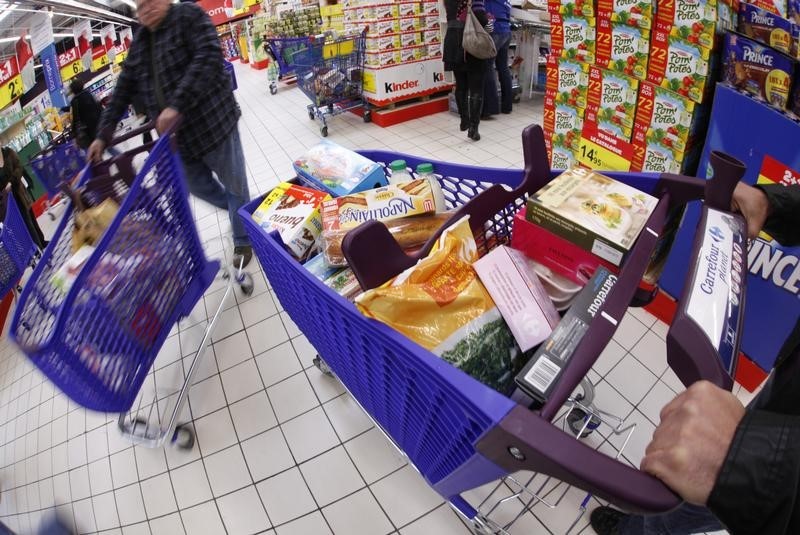PARIS (Reuters) - French consumer prices fell on an annual basis in January, their first decline in more than five years, data showed on Thursday, in another illustration of the challenge the European Central Bank faces in meeting its inflation target.
French consumer prices declined 0.4 percent year-on-year, dragged down by a 7.1 percent drop in energy prices and a 1.4 percent drop in the cost of manufactured goods, statistics office INSEE said.
Prices last fell on an annual basis in the euro zone's second-largest economy in October 2009, when the consumer price index dropped 0.2 percent.
Month-on-month, prices fell 1.1 percent in January from December, with winter sales also affecting prices.
Economists polled by Reuters had forecast slightly smaller drops in prices of 1.0 percent month-on-month and 0.3 percent year-on-year.
France's Socialist government has repeatedly warned of the risk of outright deflation in the euro zone as part of its campaign for more growth-oriented fiscal and monetary policy in the bloc.
But analysts said the risks of persistent deflation, which would prompt consumers and business to defer spending, in France were still limited.
"We should stay with negative inflation for a couple of months but I don't think there is a risk of deflation as the growth outlook is improving, which should help lift inflation," BNP Paribas (PARIS:BNPP) economist Dominique Barbet said.
"The risk of deflation is particularly low in France because of the rigidity of wages. This is not like in other countries like Spain."
French core inflation, which excludes the most volatile consumer prices and tax measures as well as public-sector prices, edged up 0.2 percent from a year ago after contracting for two months in a row, mitigating deflation fears.
Consumer prices in fellow euro-zone member Finland fell in January in annual terms for the first time since January 2010, mainly due to a drop in oil and food prices, a separate set of data showed on Thursday. Prices also fell in the whole euro zone on an annual basis in January, according to a Eurostat estimate.
European Central Bank policymakers have warned that euro zone prices may fall for some of the coming months because of a huge drop in oil prices.
Governing council member Christian Noyer said on Tuesday that the ECB's asset purchase programme was large enough to ensure that euro zone inflation returns to its target of just under two percent in the second half of next year.
BACKGROUND
French EU-harmonised inflation fell to a historical low of -0.8 percent in July 2009 and reached an all-time high of 4.0 percent in July 2008, according to INSEE's records going back to 1991.
GRAPHIC
http://link.reuters.com/wun37t
 Carrefour (PARIS:CARR) Planet supermarket in Nice Lingostiere" alt="© Reuters. Customers push shopping trolleys down an aisle at Carrefour Planet supermarket in Nice Lingostiere" rel="external-image">
Carrefour (PARIS:CARR) Planet supermarket in Nice Lingostiere" alt="© Reuters. Customers push shopping trolleys down an aisle at Carrefour Planet supermarket in Nice Lingostiere" rel="external-image">